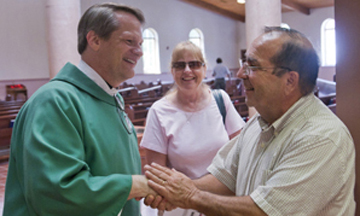
 Coming from the seminary, our newly ordained priests and deacons had certain expectations about what parish life would be like. So far, they’ve had some surprises, and discovered that being a priest is much more intense than it looks.
Coming from the seminary, our newly ordained priests and deacons had certain expectations about what parish life would be like. So far, they’ve had some surprises, and discovered that being a priest is much more intense than it looks.
Fathers Matthew Gray, William Hearne and David Nerbun, who were ordained in July, and Deacon Mark Good shared their experiences and thoughts on how future priests can prepare themselves.
Father Gray spent his transitional time, from deacon to priest, at St. Joseph Church in Columbia. He said it is incredibly busy there, and he is learning to handle the administrative part of running a church in a pastoral way.
Academic knowledge is not the same as first-hand experience, and the new priest said he is humbled by the vast amounts of time and energy that go into day-to-day decisions.
In fact, each of the men said that while seminary is thorough in theology and philosophy, it could use more practical courses on the administrative and human elements of a parish.
“The best part by far is saying Mass,” Father Gray said. “It’s an amazing privilege. It’s so powerful to say the words of consecration.”
The best advice he’s received is to treat each person like Christ and give them your full attention, which is hard to do sometimes because there are so many demands on a priest.
“You realize they call you Father for a reason,” he said with a laugh.
Father Hearne said he was surprised at how quickly he was welcomed into the parish family of St. Michael in Garden City, and praised the congregation for their generosity and support.
Fresh out of the gate, he was immediately challenged by the task of guiding a couple through marriage preparation, which is not an area the seminary spent much time on, he said. He is using common sense and being a good listener.
Father Hearne said everything that is a challenge comes down to the human element, and the only way to prepare for that is serving in the parish.
“Too much time is spent in the cloistered environment of the seminary,” he said. “They need to push them out into the parish sooner.”
Aside from Mass, the priest said of all the sacraments, anointing people in the hospital touches him the most.
“There is something very compelling about it for them and me,” he said.
Father Nerbun, who is serving at St. Gregory the Great in Bluffton and as chaplain at USC-Beaufort, said he feels most comfortable and natural at the altar.
“I just feel like I belong up there,” he said.
Parish life, and celebrating five and six Masses in a weekend, is more intense than he envisioned and requires a big adjustment.
Even saying first blessings is so much tougher mentally than it looks, he said, just making a connection of who each person is and remembering personal information.
In his first weekend as a priest, Father Nerbun said he was so exhausted he almost slept through the 5 p.m. Mass on Sunday.
The priest said it would be helpful for seminaries to have courses on how to organize a day, a more practical understanding of family life and marriage, and guidance on how to preach about the big issues like bioethics and sexuality.
Delivering a good homily was another common concern for the men.
Margaret Bachner, a volunteer at St. Gregory the Great, said a parish can be overwhelming, and advised priests to just be themselves.
Deacon Mark Good said he has had a wonderful learning experience at St. Theresa the Little Flower Church in Summerville.
Helena Moniz, administrative assistant at St. Theresa, said it is the parish’s role to teach seminarians and new priests the practical side of things.
“It’s like a team effort here to help me grow,” Deacon Good said, noting that Msgr. Edward D. Lofton has been a great mentor, especially with the challenge of homilies.
The deacon said he watched priests over the years and always thought their homilies seemed effortless. He laughed at his naivety and said he quickly realized how much work they really are.
Echoing the thoughts of the new priests, Deacon Good said he was also surprised by how much like a business the church is.
He said extra courses on the minutiae of being a priest, and how to manage it without being overwhelmed would be beneficial.
“Once the stole comes off, you still have a lot of your day to do,” he said.
Maintaining a sense of humor helps, but the deacon said he could handle the greeting line better. While he enjoys talking to parishioners and wants to hear their concerns, sometimes advice and criticism can wear on a priest’s confidence.
Deacon Good has two more semesters at Mount St. Mary before he is ordained into the priesthood.
Deacon Filip Wodecki will also be ordained into the priesthood. He spent a pastoral summer at St. Elizabeth Ann Seton in Simpsonville.
Parishioners at all the churches said they are thrilled to have the new priests.
“We are blessed by the fact that they said yes to God’s call, and [should] remember that everything they are doing is for the love of God,” Moniz said.
